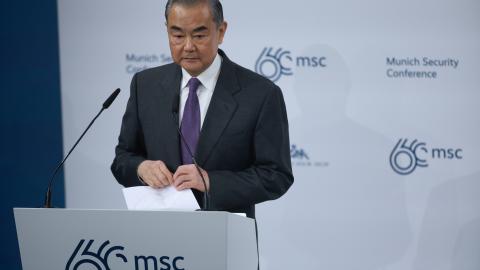Paul Keating has accepted Chinese Foreign Minister Wang Yi’s extraordinary invitation to meet on the sidelines of his official visit to Australia.
It’s clear the meeting will overshadow the official diplomatic meetings Wang Yi will participate in this week, but it goes much further: China’s chief diplomat has found a novel way to insult his Australian host and advance his country’s interest at the same time.
First, the part about insulting his host.
Beijing is fully aware that the former prime minister has been levelling personal and ungracious criticisms against Foreign Minister Penny Wong and Australian strategic policy more generally.
That Wang Yi’s invitation was a calculated move to belittle his Australian host is obvious. He will be delighted Keating accepted. There is cunning and purpose behind Wang reaching out to Keating. From foreign interference to economic punishment, Beijing’s aim is to divide the Labor Party and the Australian community. This is attempted through seduction or coercion to encourage voices within the government to agitate for a softening of policies towards China.
There are some in Labor who agree with Keating that our alliance with the US and arrangements like AUKUS do not serve our interests because they are an affront to China. Using the drama of an unofficial meeting to amplify the voice and standing of Keating is designed to make it more difficult for the Albanese government to stiffen future policies towards China.
The Albanese government has inadvertently created this opening for Wang Yi’s bold diplomatic move. Beijing has been praising the current government for learning from the supposed mistakes of the Turnbull and Morrison governments. And the Albanese government has been happy to accept the congratulations. There might be poor appetite for the rest of us to rake over the coals of why that breakdown in relations occurred prior to Labor retaking power. But it is important we do so because it reveals why Xi Jinping was so aggrieved with what happened before, and why Beijing believes the Albanese government can become even more compliant – this time with Keating’s assistance.
It is easy to identify the specific decisions that most enraged Beijing because it was so explicit – the Fourteen Grievances issued to Australia in November 2021 was a case-in-point.
Beijing knows many Australian policies will never align with Chinese interests. What it does not tolerate is Australia persuading other countries to adopt similar actions. For example, it wasn’t just that we banned Huawei from participating in our 5G network rollout. The greater offence was that Australia successfully encouraged others to do the same.
This was the same with Australia leading the way in demanding Beijing abide by the legally binding 2016 Arbitration Decision, which ruled against its expansive claims to the South China Sea, or starting a conversation among liberal democracies about protecting one’s institutions against Chinese interference and covert influence.
That occurred under Turnbull. Under Morrison, Australia promoted the framing that the greatest threats are from an axis of revisionist and coercive authoritarian countries led by China, Russia and Iran. It was a leading voice in warning other countries that China is preparing for war in the Taiwan Straits and the only sensible option is to deter Beijing by increasing our hard power capability and willingness to use it.
Xi was also furious with Morrison’s insistence that China take responsibility for reckless and dishonest decisions which led to a global pandemic.
In that period, Australian activism was praised by Japan, the US, Britain and Lithuania. The more economic punishments China imposed on Australian exporters, the more prominent a platform given to Canberra by entities such as the Quad (consisting of the US, Japan, India, and Australia) and the Group of Seven forum. It was a period when Beijing openly condemned Australia as an upstart and troublemaker.
We are now in a calmer period with China.
Wang Yi is not so deluded as to think that Canberra will abandon AUKUS or downgrade our alliances. But it would like to see Australia continuing to swim within the lanes China sets for us in the name of stabilising the bilateral relationship.
The current government has done some of that. For example, 19 and 13 economies joined our WTO actions against Beijing on China’s wine and barley restrictions respectively.
For the sake of improving bilateral ties, Australia dropped those cases meaning China suffered no economic or institutional injury by using bilateral processes to negotiate its way back to square one.
The Albanese government supports AUKUS but has dutifully downplayed the urgency of collective deterrence against China over Taiwan. Australia is no longer the same leading voice against Chinese maritime aggression, intellectual property theft, economic coercion or other activities that are an affront to our preferred system of rules and laws.
But the more we concede, the more China probes and pushes.
Wang Yi and Keating will express a very similar view that abandoning the international activism of the Turnbull/Morrison years is not enough and Australia must become even more compliant if it wants to have an enduringly stable relationship with China.
The former prime minister and Chinese foreign minister are hoping some members of the Labor Party and other prominent Australians will give support to their perspective after their meeting – compelling Albanese to oversee an increasingly timid foreign policy.
This is why Wang Yi issued the invitation to Keating, and what he hopes the stabilisation project with Australia will achieve for China.















